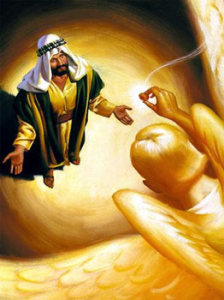 It is not often that God asks a question. This week we’re noticing a few of the famous occasions when He did, however. What we’re learning is that when the All-knowing God does ask a question, He does so–not for His own benefit–but for man’s.
It is not often that God asks a question. This week we’re noticing a few of the famous occasions when He did, however. What we’re learning is that when the All-knowing God does ask a question, He does so–not for His own benefit–but for man’s.
This morning let’s consider another example of God (or Christ) asking a question.
 The setting for this question is the very throne of God. The prophet Isaiah is in the midst of a vision where he is soon to receive his commission to go and preach to sinful Judah. The prophet describes the scene as similar to the Temple, only more Heavenly. Instead of the manifestation of God’s presence resting atop the Ark of the Covenant, God Himself is depicted a seated on His throne. Instead of Cherubs on either side, Seraphs are described as floating in God’s presence and crying out “Holy Holy Holy.”
The setting for this question is the very throne of God. The prophet Isaiah is in the midst of a vision where he is soon to receive his commission to go and preach to sinful Judah. The prophet describes the scene as similar to the Temple, only more Heavenly. Instead of the manifestation of God’s presence resting atop the Ark of the Covenant, God Himself is depicted a seated on His throne. Instead of Cherubs on either side, Seraphs are described as floating in God’s presence and crying out “Holy Holy Holy.”
The spectacle is so powerful that Isaiah weeps for his sins and for the sins of his people. An angel flies over to him and touches his lips with a burning coal (taken from the altar of incense) and says that the prophet’s sins are forgiven.
Let’s not get into the particulars of this amazing vision right now, because there’s a question to consider…
Also I heard the voice of the Lord, saying, Whom shall I send, and who will go for us? Then said I, Here am I; send me.
Isaiah 6:8
God asks “Whom shall I send…” and when you read the account of the vision there is no reason to assume any other person, other than Isaiah, is present at this location. This question is not asked broadly; God is asking it to Isaiah in particular. His question is a test of Isaiah’s readiness to take the message to the people.
The prophet passes the test: Being (in the context of this vision) absolved from his sins, he shouts excitedly “here am I; send me!” In the original Hebrew, the statement is emphatic: “LOOK OVER HERE! ME! SEND ME!”
After an experience like Isaiah just enjoyed, the prophet does not consider his life complete; he does not desire to go back to his normal life and keep his proverbial pew warm on the occasional Lord’s Day. He does not presume that he has now “done enough” for God. Instead, he volunteers for more service!
Thus the question of God should be asked of each of us.
Who will go for God and be His messenger?
Don’t have the attitude “I’ve done enough.” Don’t ever say “I’ve got too much to do already.”
God is asking for YOU; will you step up to the plate? The Gospel needs to be taken to the whole world, person-by-person, soul-by-soul. Jesus says “Go ye into all the world…” (Mark 16:15). The Gospel isn’t going to preach and teach itself. Men must teach men. Go “ye” means go “me.”
Will you be sent? Will you go?
Think about it,
have a great day!

Leave A Comment